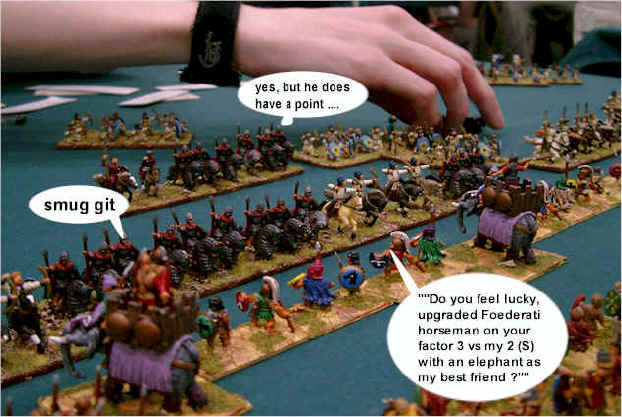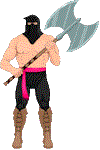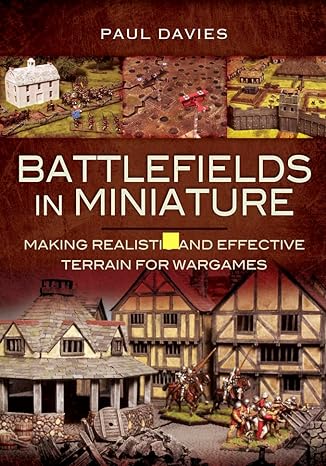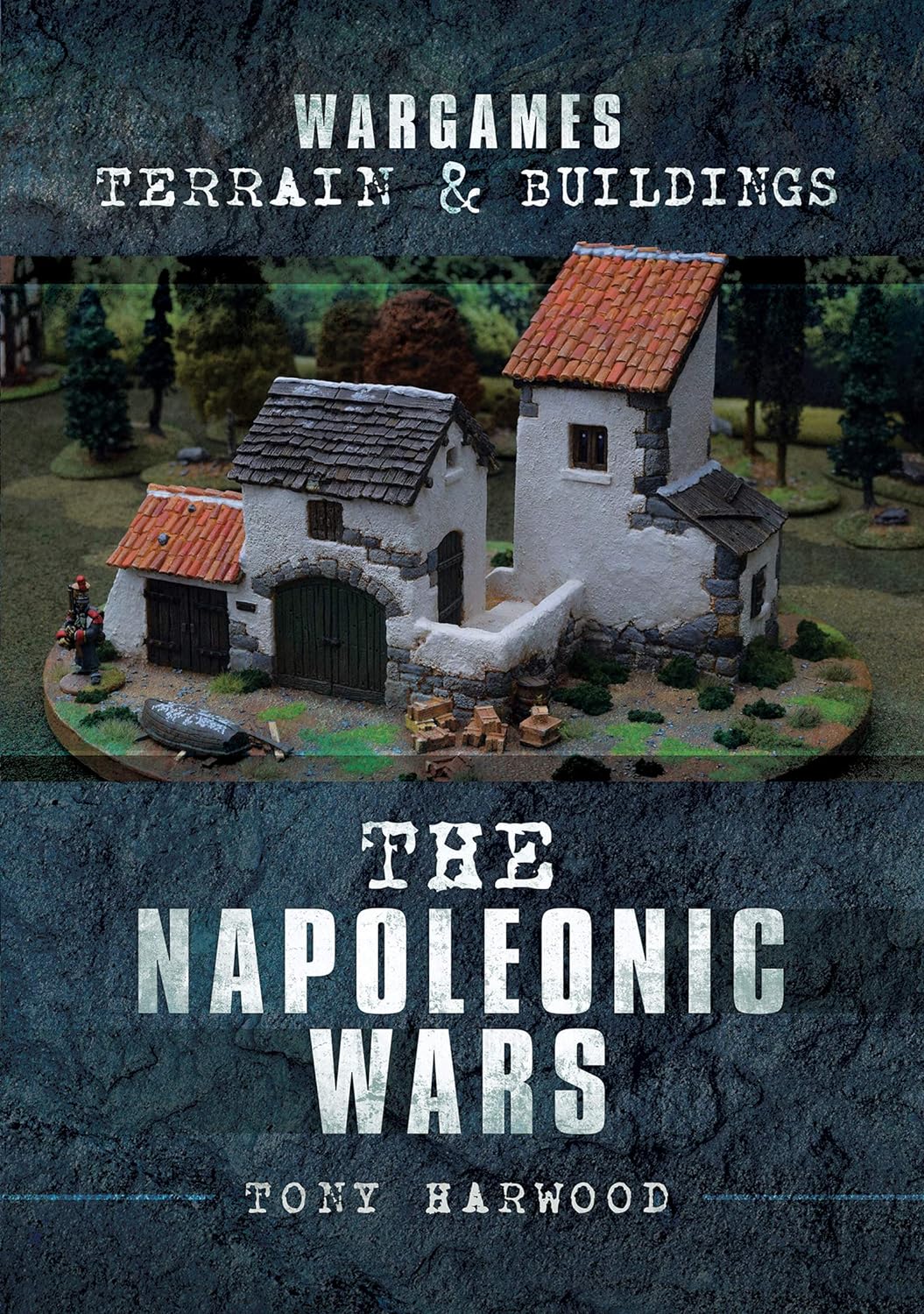Britcon 2003 - My Opponents 4-6
Game 4
Reasonably Standard Patsy Roman
|
BdO |
4 |
LhS Gen |
1 |
LhS Gen |
1 |
|
PsO |
4 |
LhF |
2 |
LhF |
2 |
|
KnF |
6 |
LhS |
4 |
LhO |
4 |
|
LhS Gen |
1 |
AxS |
8 |
AxS |
8 |
|
LhF |
2 |
PsO |
9 |
PsO |
8 |
|
LhO |
4 |
PsS |
1 |
|
19 |
|
|
19 |
|
20 |
The Patsys attempted the rather clever Patsy trick of throwing out a light horse screen... however suddenly this found itself being picked apart and chewed up by psiloi and elephants - and also by my rather more numerous light horse - including a Numidian who managed to sneak round the back of the Roman lines, preventing some auxilia from reaching the front as they were detached to deal with him.
After a lot of shuffling, and with the auxila mostly out of the game as pips were thrown at the LH to save them from the wall of death approaching, the Romans were finally there with close to the best match-ups possible... Kn (F) vs Ps (S), and LH vs Elephants - with warband ready to mug anyone who dared to get through this rather surprisingly intimidating front line. Erm... what now ......?

The roman knights dithered, waiting for some auxilia to arrive (top right) to give them a secure flank from which to launch their attack. But with my spears pushing forwards on the near side, too many of the Roman light horse got caught between the battle lines, undermining the Kn's ability to take losses - and over on my left the Romans had little answer to the LH/El/Cv combo advancing towards them . Eventually the battle was joined - with my spears now providing a rock-solid flank to the scene above - and as the elephants handed out a kicking to everything they faced and with the warband on hand to deliver the coup-de-grace to the breaking through surviving knights it was 10-0 to the Carthginians.
Irritatingly Clever Achemenid Persian
|
Cv Chariot Gen |
1 |
LhF |
1 |
CvI |
6 |
PsO |
6 |
|
LhO |
5 |
ElO |
1 |
HdO |
5 |
HdO |
3 |
|
HdO |
4 |
CvS Gen |
1 |
CvS Gen |
1 |
CvI |
6 |
|
PsO |
6 |
HdO |
1 |
Lhf |
1 |
SpO |
5 |
|
AxO |
7 |
|
3.5 |
CvO |
2 |
SpO Gen |
1 |
|
CvO |
2 |
CvS |
3 |
SpS |
2 |
||
|
|
20 |
KnF |
2 |
|
21.5 |
||
|
LhO |
1 |
||||||
|
|
18.5 |
Providing clutter with steep hills I managed to slightly narrow the battlefield against what I understood to be a highly maneuverable 4 command army - and so it was. The Carthaginians adopted their usual tactics of forming a big long line and charging forwards, with warband in the center (one flank protected by a steep hill), spears to the left and the two mounted commands operating together on the right.
The King of Kings bravely cowered in the center, along with his personal bodyguard spears and let his main command of half-rubbish cavalry on my right take the brunt of the action (if not the fighting) - but as they rushed forwards a lone Numidian slipped round the back and blew North African raspberries at the back end of the column of advancing Persian cavalry.
This effectively deprived this command of 1-2 pips per turn and slowed their advance considerably as they detached elements to try and deal with this worrisome buggererabouter, and soon they were marooned in no-mans land as my cavalry faded away before them, leaving only an elephant as a souvenir the knights really did not want to find lurking at the bottom of their holiday suitcases.
In the center the K.o.K. (my abbreviation) rearranged his auxilia carefully behind the now fast retreating skirmish screen from the spear command - who them managed to flee into the middle of their formation, thus depriving some auxilia of rear support as they were hit by the almost unfeasibly effective line of warband and over-brave elephants. The auxila were smashed, leaving the spears fidgeting nervously barely more than a single move from my warband as the command broke in the Persian turn - and instantly the army increased in points by 4 as the "King of Cheeses" turned himself into a Kn (F). My shock was rather significant, only to be bettered when I proceeded to roll nothing higher than a 2 on the pip dice and my warband gleefully rushed into the now demoralized but still rather scary general. Even impetuously we got overlaps in - but still 2 died.
My spear command rushed in as fast as it could to help, fleeing the now routing cavalry and light horse before it taking hordes with them as they went - and the elephant command desperately committed light horse into the now jubilant "King of the World" - we bounced!
He charged on - and managed to nail our light horse despite being overlapped again - taking another auxilia and psiloi with them. He had now virtually done more damage to my army in his "retreat" incarnation than the rest of his entire force! In one desperate last move we hurled warband into the spears, and attempted to mug some Cv (I) with a warband who had got lost. This was it. Beat 2 files of spears with overlaps and push back a double overlapped Cv (I) with a Wb (F) and the game was ours.
We rolled, We killed the spears.
We rolled, but, possessed by the spirit of his leader, we lost 5-1 to the Cv (I) - and the warband command broke - with more than half its casualties caused by the fleeing King Of Wishfuil Thinking" !!!!!!! 6-4.
|
KnF Gen |
1 |
KnF Gen |
1 |
Sp I |
20 |
KnF |
4 |
|
LhO |
6 |
SpO |
17 |
CvO |
1 |
KnF Gen |
1 |
|
KnF |
5 |
PsO |
1 |
Cv GEN |
1 |
LhO |
5 |
|
AxS |
6 |
|
18.5 |
|
22 |
PsS |
6 |
|
LhF |
4 |
|
13 |
||||
|
|
22 |
I took my army to play Jez's Spearwall. I also designed it to play LH and Kn.
Jez didn't take it.
He lent it to a mate who used it because his first choice army was dropped off a table by his son.
His mate changed it to a Lydian, with Kn & LH.
Some people do know how to choose their mates, don't they.
10-0. Ouch.
The Ancient Army List Index
The Rise of Rome (280 BC to 25 BC) Mid Republican Roman ; Late Republican Roman ; Gallic ; Pyrrhic ; Later Carthaginian ; Ancient Spanish ; Later Macedonian ; Later Seleucid ; Later Ptolemaic ; Attalid Pergamene ; Numidian or early Moorish ; Pontic ; Early Armenian ; Parthian ; Later Jewish ; Illyrian ; Spartacus Slave Revolt ; Bosporan ;
Storm of Arrows - Western Europe in the Later Middle Ages (1300 AD to 1500 AD) Medieval French ; 100-yrs War English (Continental) ; 100-yrs War English (Britain) ; Later Medieval Scots ( Britain) ; Later Medieval Scots (Continental) ; Later Scots Isles & Highlands ; Medieval Welsh ; Later Anglo-Irish ; Medieval Irish ; Low Countries ; Later Medieval German ; Italian Condotta ; Swiss ; Free Company ; Medieval Burgundian ; Medieval Danish ; Medieval Swedish ; Medieval Castilian ; Medieval Crown of Aragon ; Medieval Portugese ; Later Granadine ; Navarrese ; Ordonnance French ; Wars of the Roses English ; Ordonnance Burgundian ; Santa Hermandad Nueva Castilian
Immortal Fire - The Greek, Persian & Macedonian Wars (550 BC - 146 BC)
Classical Greek ;
Early Achaemenid Persian ;
Lydian ;
Thracian ;
Syracusan ;
Early Carthaginian ;
Skythian or Saka ;
Kyrenean Greek ;
Late Dynastic Egyptian ;
Alexandrian Macedonian ;
Later Achaemenid Persian ;
Classical Indian ;
Early Successor ;
Early Sarmatian ;
Galatian ;
Hellenistic Greek ;
Graeco-Bactrian ;
Graeco-Indian ;
Indo-Greek :
Legions Triumphant - Imperial Rome (25 BC to 493 AD) Dominate Roman ; Principate Roman ; Foederate Roman ; Later Sarmatian ; Early German ; Dacian or Carpi ; Ancient British ; Caledonian ; Early Alan ; Jewish Revolt ; Sassanid Persian ; Kushan or Indo-Skythian ; Palmyran ; Early Frankish, Alamanni, Burgundi, Limigantes, Rugian, Suevi or Turcilingi ; Western Hunnic ; Early Visigothic & Early Vandal ; Early Ostrogothic, Herul, Sciri or Taifali ; Early Anglo-Saxon, Bavarian, Frisian, Old Saxon or Thuringian ; Gepid or Early Lombard ; Early Scots Irish ; Early Pictish ; Hephthalite Hunnic ;
Swords & Scimitars - The Crusades (1096 AD to 1311 AD) Early Crusader ; Later Crusader ; Fatimid Egyptian ; Georgian ; Seljuk Turk ; Cuman ; Komnenan Byzantine ; Post Latin Conquest Byzantine ; Ilkhanid Mongol ; Mamluk Egyptian ; Cilician Armenian ; Syrian States ; Khwarazmian ; Ayyubid Egyptian ; Middle Serbian ; Middle Bulgarian ; Medieval Cypriot ; Latin Greece ; Pecheneg ;
Eternal Empire - Eastern Europe and the Rise of the Ottomans (1300 AD to 1500 AD) Early Ottoman Turkish ; Later Ottoman Turkish ; Tatar ; Later Russian ; Later Serbian Empire ; Later Bulgarian ; Later Lithuanian ; Later Polish ; Later Teutonic Knights ; Catalan Company ; Middle Hungarian ; Moldavian or Wallachian ; Albanian ; Timurid, White Sheep Turcoman or Black Sheep Turcoman ; Later Hungarian ; Hussite ;
Decline & Fall - Byzantium and Islam (493 AD to 1071 AD) Early Byzantine; Maurikian Byzantine ; Thematic Byzantine ; Nikephorian Byzantine ; Later Moorish ; Later Visigothic ; African Vandal ; Italian Ostrogothic ; Early South Slav ; Lombard ; Avar ; Arab Conquest ; Early Bulgar ; Ummayad Arab ; Abbasid Arab ; Early North African Dynasties ; Khurasanian Dynasties ; Bedouin Dynasties ; Dailami Dynasties ; Pecheneg ; Ghaznavid ; Western Turkish (includes Khazar);
Wolves From The Sea - The Hairy European Dark Ages Post Roman British ; Early Welsh ; Later Scots Irish ; Merovingian Frankish ; Later Pictish ; Early Slavic ; Middle Anglo Saxon ; Astur Leonese ; Andalusian ; Early Navarrese ; Carolingian Frankish ; Viking ; Magyar ; Great Moravian ; Early Scots ; Rus ; Norse Irish ; Early Medieval French ; Early Medieval German ; Norman ; Early Polish ; Anglo Danish ;
Swifter Than Eagles - The Biblical Book Nubian ; Early Libyan ; Later Sumerian or Akkadian ; Early Nomad Allies ; Old or Middle Kingdom Egyptian ; Hyksos ; Mitanni ; Syro-Canaanite ; New Kingdom Egyptian ; Later Minoan or Early Mycenaean ; Hittite Empire ; ; Middle or Early Neo-Assyrian ; Later Mycenaean or Trojan ; Sea Peoples ; Philistine ; Phoenician Allies ; Neo-Hittite And Aramaean ; Later Hebrew ; Mannaean Allies ; Libyan Egyptian ; Urartian ; Median ; Neo-Elamite ; Proto-Arab Allies ; Cimmerian or Early Skythian ; Neo-Assyrian Empire ; Phrygian Allies ; Kushite Egyptian ; Neo-Babylonian Empire ;
Oaf of Fealty - Early Medieval Europe Feudal Catalan and Early Crown Of Aragon ; Early Hungarian ; Taifa Andalusian ; Feudal Navarrese and Aragonese ; Feudal Castilian Leonese or Portuguese ; Fanatic Berber ; Italo-Norman ; Feudal French ; Imperial German ; Feudal German ; Communal Italian ; Papal Italian ; Early Scots Isles And Highlands ; Feudal Scots ; Early Russian ; Feudal Polish ; Anglo-Norman ; Later Welsh ; Early Lithuanian or Samogitian ; Wendish Prussian or Estonian ; Early Medieval Frisia and Other Free Cantons ; Post-Viking Scandinavian ; Early Plantagenet English ; Later Sicilian ; Early Medieval Irish ; Early Anglo-Irish ; Early Teutonic Knights ; Mongol Invasion ; Early Granadine ; Middle Plantagenet English ;
Empires of The Dragon - China, Korea and Japan Erlitou-Shang Chinese ; Early Northern Barbarian Allies ; Early Zhou Chinese ; Yayoi Japanese ; Early Horse Nomad ; Ko Choson Korean ; Warring States To Western Han Chinese ; Qiang And Di ; Three Kingdoms Korean ; Eastern Han Chinese? ; Three Kingdoms W Jin And S Dynasties Chinese ; Kofun Nara Japanese ; Northern Dynasties Chinese ; Later Hindu North Indian ; Later Hindu South Indian ; Central Asian City States ; Western Wei To Early Tang Chinese ; ; Later Horse Nomad ; Tibetan ; Nepalese Allies ; Parhae Korean ; Late Tang To Five Dynasties Chinese ; Khmer Or Champa ; Thai Allies ; Nanzhao ; Pyu Burmese Allies ; Koryo Korean ; Early Heian Japanese ; Pagan Burmese ; Liao ; Song Chinese ; Xi Xia ; Ghurid Afghan ; Jin ; Late Heian To Muromachi Japanese ; Japanese Warrior Monk Allies ; Mongol Conquest ; Moslem Indian Sultanates ; Medieval Indonesian Or Malay ; Yuan Chinese ; Medieval Burmese ; Ming Chinese ; Yi Korean
Blood and Gold - The Americas Olmec ; Teotihuacan ; West Mexican ; Zapotec or Mixtec ; Toltec ; Chinantec ; Aztec ; Tarascan ; Tlaxcalan Confederacy ; Mayan ; Mochica ; Chanca ; Chimu ; Hatun-Colla ; Canari ; Inca ; Mapuche or Araucanian ; Amazonian Forest Tribes ; Tupi ; Chichimec ; Pueblo Culture ; Mound-Builder Culture ; South-Eastern Woodland Culture ; Timucuan ; Eastern Woodland Culture ; Plains Culture ; Pacific North-West Culture
















